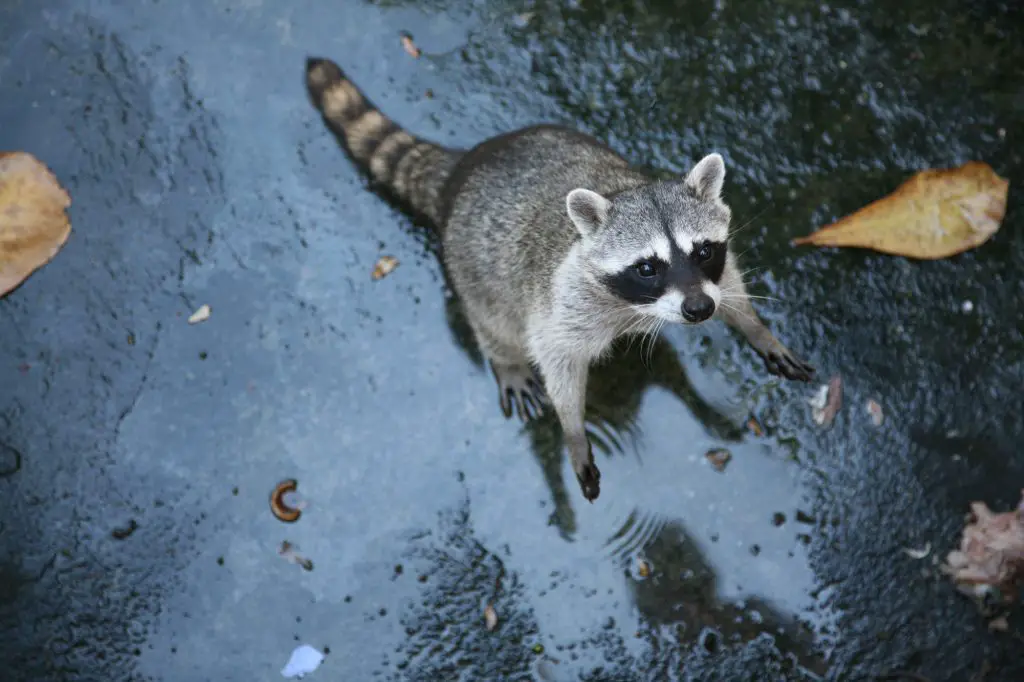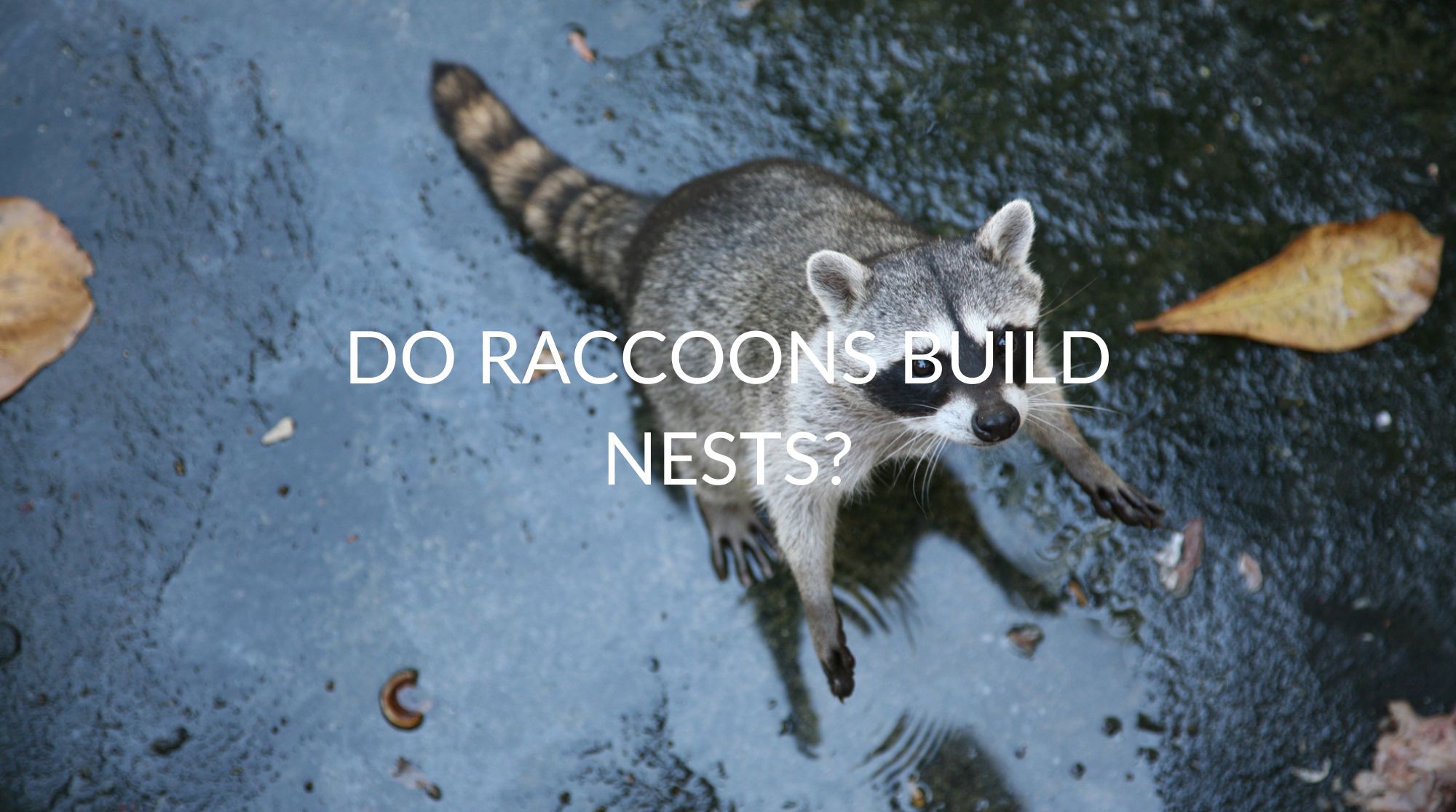Have you ever wondered whether raccoons build nests? And if they do build nests, what do they look like, and how can you spot them? If so, then you’ve found the right article. And not only will you learn all of the above, but you’ll also learn how to prevent them from becoming attracted to your property and other frequently asked questions as well!
So keep reading to find out everything you need to know!
So, Do Raccoons Build Nests?
Raccoons don’t build nests in the literal sense; instead, they move into places that already provide them with the cover and warmth they need. Once they’ve found a place, they’ll create a den similar to a squirrel’s nest.
What Does A Raccoon Nest Look Like?
A raccoon’s nest is going to look like a squirrel’s nest but simpler. Where squirrels use twigs and leaves, raccoons prefer to use material such as hay or long grass. But they’re not picky, and they’re very opportunistic.
If a squirrel is in an urban environment, then they can end up using all manner of materials to create their nest.
How Do Raccoons Make Their Nests?
Raccoons make their nests by shredding the material they find until it becomes a pile they are able to burrow into. However, ideally, raccoons will look for a den or nest that was made by another animal but has since been abandoned. They’ll claim that for themselves.

Where Do Racoons Build Their Nests?
Unfortunately, raccoons love to build their nests in places that are well insulated and safe from predators. So if you have a lot of urban raccoons, your home is going to provide them with a few ideal places for this!
Some of the most common places you can expect to find raccoon dens include:
Attics
Attics are some of the best places for raccoons to live. They tend to be unused and very well insulated. On top of this, in the winter, the heating in your house will rise, keeping the attic warm and providing the perfect place for their kits to grow.
Crawl Space
The crawl space under your house is also a great area for raccoons to live. It’s not as good as an attic, but it still provides them lots of protection and shelter while also being near food and water sources.
As well as crawl spaces, they may also stay under decking and porches too!
Trees
Trees provide some of the best natural dens for raccoons. Because they tend to nest high up in tree holes, it’s unlikely that predators will be able to get to them. As well as this, if it’s a fruit or nut tree, it’s also going to provide them with an endless supply of food as well.
But it’s not just standing trees that raccoons like. They’ll gladly make a den in fallen trees and tree stumps as long as there’s space for them.
(Find out more about raccoons and trees.)
Sheds
Another man-made structure that raccoons absolutely love sheds. Again, sheds provide raccoons with shelter and protection from the elements and predators. As well as this, they’re often undisturbed for days at a time by people.
And sometimes, it’s not the shed itself that raccoons will live in. Instead, they’ll opt to burrow underneath it. Either way, leaving raccoons in your shed or under it could end up causing damage to your property.
Garages
Garages similar to sheds can also provide raccoons the shelter and protection they need as well. And once again, if the garage is left unused, it’s going to provide the perfect den for raccoons.
Abandoned Birds Nests
It’s hard to imagine that a raccoon could fit in a bird’s nest; however, nests created by birds of prey can be big enough to accommodate a single raccoon.
Not only are these nests going to keep them warm, but dense leaves in a lot of trees will also keep raccoons out of sight as well.
Rock Crevices
Any sort of rock crevice is going to provide a raccoon with plenty of shelter from wind and rain. While they may not be a permanent den for raccoons, they can definitely provide shelter for a few days.
How To Find A Raccoon Nest
If you think that a raccoon is nesting on your property, there are a number of things of signs to look out for to let you know that a den is nearby. Some of these signs include:
Hand Prints
If the raccoons have been walking through mud, it’s also likely that they’ll leave handprints around your property.
Tracks In The Surrounding Areas
Once raccoons have established where their nest is going to be, they’re going to begin foraging for food. When this happens, you can expect to see paw prints in the surrounding area.
Raccoon Hair
You may also spot raccoon hair around your home as well, especially when the seasons are changing and they tend to shed their old coats for a new one.
Racoon hair looks similar to dog hair, and it can be white, grey, black, or brown in color.
Droppings
Another clear sign that raccoons have made a nest in your tree is that there are droppings around the tree. If you have a particularly good sense of smell, you may also smell urine.
Litter Around Your Home
Lastly, as raccoons begin to pilfer through your trash and other areas, you may begin to notice a build-up of litter and debris.
Strange Noises
You may also hear scratching and rummaging around your property when raccoons have decided to nest as well. If it’s happening at night, then it’s even more likely that it’s raccoons too!
What To Do If You Locate A Raccoons Nest?
If you locate a raccoon’s nest in your home, the best thing you can do is call a local pest control expert. Raccoons can be quite temperamental, especially if they have kits, so an expert can remove them in a way that’s safe to them and you, as well as make sure they don’t return.
If you try to take a raccoon out of its den, and the kits don’t go too, they’ll be unable to survive, so they’ll end up starving to death.
How To Prevent Raccoons From Nesting In Your Home?
However, fortunately, there are a lot of things you can do to prevent raccoons from nesting in your home. If you want to make your home as unappealing as possible, then you should do the following:
Keep Your Trash Sealed
The first thing to do is make sure your trash is well-sealed. Raccoons enjoy searching through the trash for meals. Making sure they can’t get your trash will therefore make your home far less enticing to them.
Block Off Entry To Your Home
Additionally, you should also make sure that entrances to your property are blocked off too. It’s shocking all the different ways raccoons can enter your home. So you must consider less visible entrances, such as your chimney or cat flap, in addition to addressing any more obvious points of entry.
Remove Pet Food
Make sure that you take away pet food from your pets once they have finished eating. Unfortunately, leaving pet food out all day will also draw raccoons to your house.
Shine Bright Lights At The Raccoon
If you spot raccoons in your backyard or home, when you notice them, shine a bright light on them. This is going to scare them away instantly, and if you do it enough times, they’ll begin to feel like that area is unsafe.
Make Sure Trees And Hedges Are Trimmed
You should also make sure that trees and hedges around your house are trimmed as well. This is especially true when any of these things are touching your house. A lot of the time, trees can give raccoons access to your roof or other areas of the home they can enter.
Try Scare Tactics
Things that make noise can be used to scare raccoons away as well. Wind chimes could make a raccoon jump when the wind blows, or leaving a radio on can make it seem to the raccoon that there are people in the vicinity.
Motion Activation Systems
Motion-activated sprinklers and lights can also scare raccoons, so the next time they enter your property, they might be enough to scare them away!
Improve Your Fence
If you don’t have a fence, then you should first of all install one to make it harder for raccoons to enter your premises. However, if you already have a fence, make sure that it also goes deep underground as well.
Not only are raccoons good at climbing, but they’re also good at digging, so you need to make sure you’re cutting off both ways in.
Predator Urine
And lastly, predator urine can be an effective way to get rid of raccoons as well. Bobcats, cougars, and even domestic dogs are all predators to raccoons, so purchasing some predator urine is a great way to deter them!
FAQ
Now you know what a raccoon den looks like, how to spot it, and how to prevent them from entering your property; here are a few frequently asked questions that people have about raccoons!
Do Raccoons Nest Together?
While it’s less likely for male raccoons to nest together, female raccoons can often stay in groups known as a gaze. However, during winter, it’s not uncommon for raccoons to nest together to stay warm, not just with themselves but with other species of animals as well.
When Do Baby Raccoons Leave The Den?
Baby raccoons tend to move from den to den with their mother until they’re about 1 year old.
Do Raccoons Return To The Same Nest?
Raccoons tend to have a few different nests they return to again and again, especially if one of their nests has been destroyed.
Recap
As you can see, raccoons may not build nests, but they do have dens that are fairly similar. And a lot of the times, the perfect place for them to have a den in your home. So you need to make sure you’re doing everything you can to prevent them from making their home in yours!
If you liked this article, make sure you check out the rest of the website! Otherwise, have a great day!


